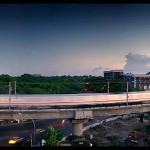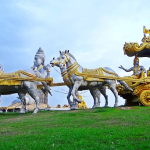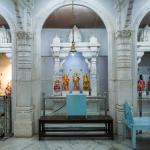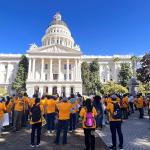The Hindu
Industrial and commercial activities as also air services were affected in large parts of the country today as the day-long strike by Left trade unions crippled work in public sector banks and insurance companies and government undertakings to protest the UPA government’s economic policies.
The impact of the strike was the maximum in the Left-ruled West Bengal where life almost came to a standstill with public transport, including train services, remaining paralysed.
Only two flights–one each from Delhi and Mumbai– landed at Netaji Subhaschandra Bose international airport which was the worst-hit by the Airport Authority of India employees’ protest against privatisation of Delhi and Mumbai airports.
An estimated 35 to 40 per cent flights were cancelled due the strike, mainly by the ground staff, in which the Air Traffic Controllers did not take part. Apart from Kolkata, Delhi and Mumbai, the hub of the country’s air operations, were badly affected by the strike.
However, in Chennai, Thiruvananthapuram and Kochi airports flight services remained unaffected while there was some impact in Bangalore and Hyderabad where nine and 11 flights, mostly Kolkata-bound, were cancelled. In Ahmedabad all 20 flights operated normally.
Civil Aviation Minister Praful Patel, claimed that the operations at the airports throughout the country, including Kolkata, remained unaffected during the dawn to dusk strike.
While private sector banks operated as usual, state-owned banks and insurance companies were almost completely paralysed by the strike putting people and business into severe discomfort in view of the fact tomorrow also there will be no public transactions because of “closing”. ATM operations came to the rescue of a harried public.
Finance Minister P Chidambaram, gave an assurance that the banks will work extra hours on Saturday to clear the backlog. In Bangalore, home to a large number of defence and other public sector industries, the strike affected in these units while normal life remained unaffected except for a strike by auto-rickshaws. In Tamil Nadu, the strike had only a partial impact, mainly on the financial sector, because the major unions controlled by the AIADMK and DMK did not join the protest.
Meanwhile, the central trade unions, which sponsored the strike, threatened to intensify their stir if UPA does not change its anti-labour policies.
Disputing Chidambaram’s statement that the impact of the strike was “marginal”, the trade unions – CITU, AITUC, AICCTU, HMS and TUCC – asserted that the strike was “massive success”.
“I have not seen such a widespread strike throughout the country before. If the government does not yield to our demands, there will be larger strike and for longer duration,” Gurudas Dasgupta of the AITUC said at a joint press conference.
Criticising the UPA for following previous NDA policies with greater vigour without safeguarding interest of workers, he said “let government read the writing on the wall and change the policies. Otherwise, country will be in peril.”
Terming the strike as “biggest ever since globalisation”, CITU leader M K Pandhe, said it shows the dissent of working class on various economic policies like hike in the prices of petrol, water and electricity charges.
If the government does not change its policies and abide by the CMP mandate, he said trade unions will discuss future course of action at Indian Labour Conference on December 9-10.
The strike was called by the central trade unions to protest against economic policies, proposed disinvestment and “dilution” of labour laws.
PSUs, banks and insurance companies remained closed across the country that led to financial loss of over Rs 1,000 crore to the nation, V K Gupta of the United Forum of Bank Unions told PTI here after a demonstration outside SBI.
However, Reserve Bank was open and carried out clearing operations, All India Reserve Bank Employees Association President M L Malkotia, said adding private and foreign banks also carried out normal business.
“We urge the UPA regime to draw appropriate lessons from this resistance and swiftly change gear and bring about a directional change in their economic policies,” the trade unions said in a joint statement.
The unions wanted UPA to reverse its decision on corporatisation of Security Press and government mints, and opposed the involvement of private players in airport modernisation.
“The chorus of labour law changes has been revived, reportedly at the instance of Prime Minister himself,” the unions alleged referring to two bills — Labour Laws Bill and SME Development Bill — which were introduced in Parliament without any consultation with trade unions.
The trade unions also criticised the government for flatly ruling out another Pay Commission to revise the salaries of government employees.
Opposing Finance Ministry’s move to introduce an “EET” system of taxing all savings instruments, the unions said it would increase the burden of the workers.
Mumbai: Jet Airways and Indian Airlines curtailed 12 and 8 flights with IA combining flights on the Chennai, Bangalore and Kolkata routes due to “low load factor”. Air-India operated as per schedule.
Financial services including banking were, however, hit badly. Employees of PSU banks staged protests and train services on the Western Railway section were stalled for over an hour by CPI-M members at Goregaon and Andheri stations.
Nagpur: Air traffic remained unaffected as all the 3 flights operated on time.
Andhra Pradesh: Eleven flights were cancelled while banking and insurance services were partially hit with many employees joining the strike.
Chhattisgarh: Banking services were crippled as employees of 500 bank branches did not report for work although flights operated on time.
Madhya Pradesh: Work was paralysed in 2,700 post offices as well as in banks, insurance companies, coal mines and establishments like National Fertilizers Limited, Bharat Heavy Electricals Limited and Ordinance factory (Jabalpur). Flights were not affected.
Chennai: The strike evoked a partial response as AIADMK and DMK affiliated trade unions did not take part. A total of 18 domestic and 3 international flights left Chennai and train services plied as usual. Banking was hit but private banks and LIC remained unaffected.
Kalpakkam: Some employees of Madras Atomic Power Station and Indira Gandhi Centre for Atomic Research participated in the strike.
Pondicherry: Twenty-five trade union activists were taken into custody for preventing workers from attending duty.
Thiruvananthapuram: Bus services, taxis and other modes of public transport were off the road and business came to a virtual halt with shops remaining closed throughout Kerala.
Flight services to various Gulf destinations and to Sri Lanka operated normally.
Bangalore: Units under IAF training command were on standby to ensure normal flight operations while transport services, except autorickshaws, plied normally in Karnataka. Trains also ran as usual.
Kolkata: West Bengal was worst hit as shops and schools, banks and insurance companies did not function and public transport refused to operate. Air carriers cancelled their flights while train services were also paralysed due to squatting on tracks. The Kolkata metro and circular railways also did not run.
Tripura: Life in the left-ruled state came to an abrupt standstill with most services not functioning.
Assam: Banks, insurance companies, flights and transport services were hit due to the twin strike called against Army operations at Dibru Saikhowa National Park and the Left-sponsored protest.
Chandigarh: Transport services in the Union Territory, Haryana and Punjab were paralysed and functioning of state-run banks and insurance companies was affected.
Flights were able to operate after a hiccup in the morning. Trains were unaffected by the strike.
Jammu/Srinagar: Work in banks, insurance companies like LIC and GIC came to a standstill in Jammu but the strike evoked a mixed response in the Kashmir Valley with state and Central Government employees boycotting offices while air and surface links were unaffected.















